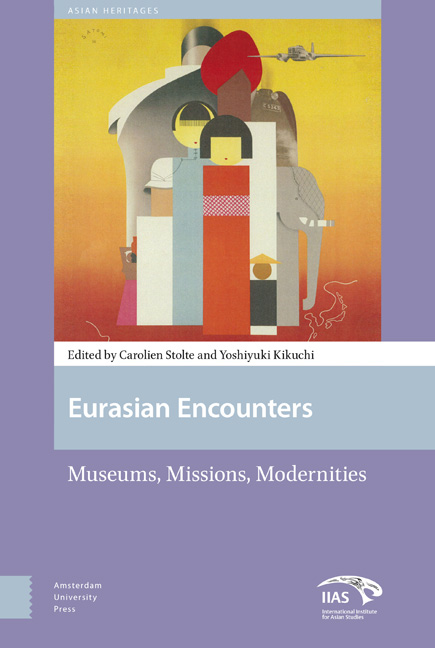Book contents
- Frontmatter
- Contents
- 1 Eurasian Encounters: Cross-border Intellectual and Cultural Exchange, 1900-1950
- Part I Artistic Spaces
- 2 The Museum at Aundh: Reflecting on Citizenship and the Art Museum in the Colony
- 3 Exhibiting the Nation: Cultural Flows, Transnational Exchanges, and the Development of Museums in Japan and China, 1900-1950
- 4 Parallel Tracks: Pan Yuliang and Amrita Sher-Gil in Paris
- 5 Bauhaus and Tea Ceremony: A Study of Mutual Impact in Design Education between Germany and Japan in the Interwar Period
- Part II Missions and Education
- 6 Schooling a Missionary in Early Twentieth-Century Eastern India
- 7 The Catholic Church in China in the First Half of the Twentieth Century: The Establishment of Zhendan University and Furen University
- Part III Shared Trajectories, New Subjectivities
- 8 Indigenizing Cosmopolitanism: Shifting Metropolitan Subjectivities in Twentieth-century Colombo
- 9 Fighting for the Soviet Empire: War Propaganda Production and Localized Discourses on Soviet Patriotism in Uzbekistan during the Second World War
- 10 Shared Origins, Shared Outcomes?: Transcultural Trajectories of Germany and Japan during the Asia-Pacific War
- Index
6 - Schooling a Missionary in Early Twentieth-Century Eastern India
Published online by Cambridge University Press: 12 December 2020
- Frontmatter
- Contents
- 1 Eurasian Encounters: Cross-border Intellectual and Cultural Exchange, 1900-1950
- Part I Artistic Spaces
- 2 The Museum at Aundh: Reflecting on Citizenship and the Art Museum in the Colony
- 3 Exhibiting the Nation: Cultural Flows, Transnational Exchanges, and the Development of Museums in Japan and China, 1900-1950
- 4 Parallel Tracks: Pan Yuliang and Amrita Sher-Gil in Paris
- 5 Bauhaus and Tea Ceremony: A Study of Mutual Impact in Design Education between Germany and Japan in the Interwar Period
- Part II Missions and Education
- 6 Schooling a Missionary in Early Twentieth-Century Eastern India
- 7 The Catholic Church in China in the First Half of the Twentieth Century: The Establishment of Zhendan University and Furen University
- Part III Shared Trajectories, New Subjectivities
- 8 Indigenizing Cosmopolitanism: Shifting Metropolitan Subjectivities in Twentieth-century Colombo
- 9 Fighting for the Soviet Empire: War Propaganda Production and Localized Discourses on Soviet Patriotism in Uzbekistan during the Second World War
- 10 Shared Origins, Shared Outcomes?: Transcultural Trajectories of Germany and Japan during the Asia-Pacific War
- Index
Summary
Abstract
This essay explores the historical context within which a group of local dwellers in the hillsides of Eastern India criticized a young missionary male of the Welsh Calvinist Mission in the opening years of the twentieth century. Using a longue durée perspective on the settlement of these hills, the chapter suggests that the tensions between the mission and the local population should be understood as failures in cross-cultural communication. These failures are particularly poignant in the stark contrast of local understandings of laywomen's work within the structure of local monastic governments, and those of post-Reformation Christianity. Rather than perpetuating the imposition of colonial and missionary categories, this chapter treats the dwellers of the hills in eastern India as ‘subjects’ of parallel non-Christian monastic governments of Buddhists, Bon, and other denominations.
An unsigned letter addressed to the directors of the mission and dated 29 August 1906 complains about a Welsh Calvinist Methodist missionary, Reverend E. Rowlands: ‘We think that his way of keeping company with young women is not good. […] One of his orphans saw him sitting and holding his young woman Thangkungi on his knee face to face and one of her legs was over his left side and the other over his right side. […] (He) saw him as he touched his young woman's bosom in the month of July this year.’
The note is rare in the historiography of interracial cohabitation in European empires in Asia and Africa. It is also rare in the annals of missionary historiography, especially those of South Asia. For this note is not written by European missionaries about the immoral behaviours of ‘native’ men and women, examples of which abounded in the late eighteenth and early nineteenth centuries. This note is the reverse. It is written by someone who was a preacher to audiences in the Eastern Himalayan hillsides: the letter complains that ‘the Gospel of Jesus Christ cannot be preached with effect in the villages because […] Lushais say that we preach against fornication but they believe that our Missionary R. Rowlands has committed fornication’. The very tenor of the complaint suggests that the letter writer foregrounds some legal and moral code that has been infringed by the Christian missionary.
- Type
- Chapter
- Information
- Eurasian EncountersMuseums, Missions, Modernities, pp. 123 - 154Publisher: Amsterdam University PressPrint publication year: 2017



